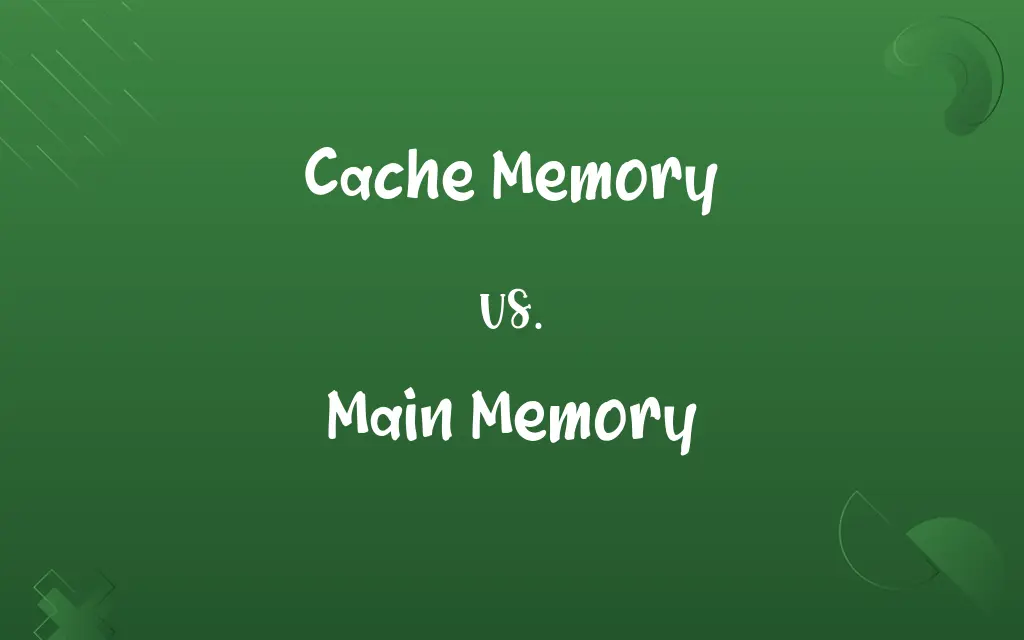Cache Memory vs. Main Memory: Know the Difference

By Hifza Nasir & Shumaila Saeed || Published on May 18, 2024
Cache memory is a fast, volatile memory for quick access to frequently used data, enhancing processor speed. Main memory (RAM) is a larger, slower volatile memory for currently used data and programs.

Key Differences
Cache memory is designed to speed up the processing by making the most frequently accessed data quickly available to the CPU, acting as a temporary storage for active processes. In contrast, main memory holds all the data and programs that are currently being processed, serving as a bridge between the fast CPU and slower storage devices.
Shumaila Saeed
May 18, 2024
Cache memory is significantly faster than main memory because it is built using more advanced and expensive technology, allowing for quicker data retrieval. Main memory, while slower, provides the necessary space to run applications and systems efficiently, balancing speed with cost.
Shumaila Saeed
May 18, 2024
The size of cache memory is much smaller than that of main memory, reflecting its role in storing only the most crucial data needed at any moment. Main memory, with its larger size, accommodates the broader needs of operating systems, applications, and user data.
Hifza Nasir
May 18, 2024
Cache memory's high speed comes at a higher cost per bit than main memory, making it economically feasible to have only a small amount. Main memory offers a more cost-effective solution for storing a large amount of data that does not require immediate access.
Hifza Nasir
May 18, 2024
The efficiency of a computer system heavily relies on the interaction between cache and main memory. The former improves performance by reducing the time needed to access data, while the latter ensures that all necessary data and programs are readily available for processing.
Dua Fatima
May 18, 2024
ADVERTISEMENT
Comparison Chart
Purpose
To speed up data access by storing frequently accessed data
To store data and programs that are currently in use
Shumaila Saeed
May 18, 2024
ADVERTISEMENT
Cache Memory and Main Memory Definitions
Cache Memory
It acts as a buffer between the CPU and main memory.
Cache memory stores copies of data from frequently used main memory locations.
Shumaila Saeed
Feb 26, 2024
Main Memory
RAM is slower but much larger than cache memory.
Modern computers typically have 8 GB or more of RAM.
Shumaila Saeed
Feb 26, 2024
Cache Memory
Cache is categorized into levels (L1, L2, L3) based on proximity to the CPU.
L1 cache is the smallest and fastest type, directly integrated into the processor.
Hifza Nasir
Feb 26, 2024
Main Memory
Main memory holds data and programs that are currently in use.
Opening multiple applications uses more RAM.
Hifza Nasir
Feb 26, 2024
Cache Memory
Cache memory improves processing speed by reducing data access time.
Websites load faster on a second visit due to cached content.
Hifza Nasir
Feb 26, 2024
ADVERTISEMENT
Main Memory
Main memory directly affects the speed and performance of applications.
Programs run faster on systems with more RAM.
Hifza Nasir
Feb 26, 2024
Cache Memory
Cache memory is a high-speed memory type that stores frequently accessed data.
A CPU uses cache memory to quickly retrieve the parts of a program it uses most often.
Shumaila Saeed
Feb 26, 2024
Main Memory
It is volatile, meaning data is lost when power is off.
Unsaved documents are lost if a computer suddenly shuts down.
Hifza Nasir
Feb 26, 2024
Cache Memory
It is more expensive and has a smaller capacity than main memory.
High-performance computers have large cache memories to enhance speed.
Dua Fatima
Feb 26, 2024
Main Memory
The amount of RAM affects a computer's multitasking capability.
Upgrading RAM can improve system performance significantly.
Shumaila Saeed
Feb 26, 2024
Repeatedly Asked Queries
Why is cache memory more expensive than main memory?
Due to its higher speed and more complex technology, cache memory costs more per bit than main memory.
Hifza Nasir
May 18, 2024
What affects the performance of main memory?
The performance of main memory is affected by its capacity, speed, and the efficiency of its management by the operating system.
Hifza Nasir
May 18, 2024
Is cache memory removable or upgradeable?
Cache memory is usually built into the CPU and is not removable or upgradeable by end-users.
Dua Fatima
May 18, 2024
What is cache memory?
Cache memory is a small, fast type of volatile computer memory that provides high-speed data access to the processor by storing frequently used data and instructions.
Shumaila Saeed
May 18, 2024
How do cache memory and main memory differ in speed?
Cache memory is significantly faster than main memory due to its closer proximity to the CPU and advanced technology.
Hifza Nasir
May 18, 2024
How do I know if I need more main memory?
If your computer is slow or struggles to run multiple applications simultaneously, increasing your main memory (RAM) may improve performance.
Hifza Nasir
May 18, 2024
What happens if main memory is full?
If main memory is full, the system may become sluggish, and the operating system may use disk storage as virtual memory, further slowing down processes.
Shumaila Saeed
May 18, 2024
What is main memory?
Main memory, also known as RAM, is the larger pool of volatile memory that holds data and programs currently in use, facilitating active processing by the CPU.
Hifza Nasir
May 18, 2024
Can a computer function without cache memory?
Yes, a computer can function without cache memory, but with reduced efficiency and speed in data access and processing.
Dua Fatima
May 18, 2024
Can upgrading cache memory improve my computer's speed?
Since cache memory is not typically upgradeable, focusing on upgrading main memory or other components may be more effective in improving computer speed.
Shumaila Saeed
May 18, 2024
How does cache memory work?
Cache memory stores copies of frequently accessed data from main memory, allowing the CPU to access this data more quickly than from main memory directly.
Hifza Nasir
May 18, 2024
Does cache memory size affect overall computer performance?
Yes, the size of cache memory can significantly affect overall computer performance, with larger caches providing faster data access.
Shumaila Saeed
May 18, 2024
What types of activities benefit most from more main memory?
Activities that involve running multiple applications or processing large amounts of data, like video editing or gaming, benefit most from having more main memory.
Dua Fatima
May 18, 2024
How can I optimize the use of cache memory?
Cache memory is automatically managed by the CPU and operating system, so end-users cannot directly optimize its use.
Hifza Nasir
May 18, 2024
What role does main memory play in a computer system?
Main memory serves as the primary storage area for data and programs that are in active use, directly influencing system speed and performance.
Shumaila Saeed
May 18, 2024
Share this page
Link for your blog / website
HTML
Link to share via messenger
About Author
Written by
Hifza NasirCo-written by
Shumaila SaeedShumaila Saeed, an expert content creator with 6 years of experience, specializes in distilling complex topics into easily digestible comparisons, shining a light on the nuances that both inform and educate readers with clarity and accuracy.








































































